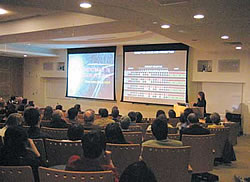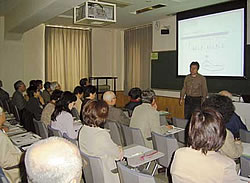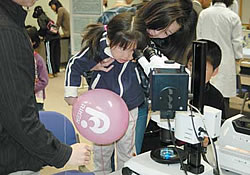Seventh Brain Science Advisory Council Meeting
For three days, from 24-26 January, 2006, prominent scientists from around the world assembled at RIKEN Brain Science Institute in Japan for the seventh Brain Science Advisory Council. Advisory Council members met to evaluate BSI's operations and provide advice for its development. Despite the tight schedule, members were able to meet with several prominent people in RIKEN's administration as well as BSI researchers to provide BSI with concrete suggestions for the next two years.
The Council praised BSI's research breadth, facilities, and its aggressive pursuit of young leaders at all levels of research, and specifically noted the efforts of the younger group directors to propel BSI forward. They also recommended that the Japanese government's investment in brain science and BSI should remain strong. In particular, BSI's Research Resources Center and Advanced Technology Development Group were commended for their strategic contribute to BSI's research goals.
Specific recommendations include:
- Increase transparency in allocation of Director's funds,
- Seek outside funding as individuals and as groups,
- Encourage collaborations with industry.
Include more detailed explanation of the Research Review process for the next BSAC meeting.
Maintain the current hiring policy for BSI Scientists to spread the "BSI Philosophy", but note that system for stable execution of that policy is lacking. They suggest:
- Making researcher turnover a part of the system
- Establish a planning and mentoring systems to support departing researchers in the transition.
While the Council was divided on the benefits of establishing permanent positions through tenure at BSI, they did recommend:
- Establish scientific excellence and leadership as primary criteria.
- Restrict the number of permanent positions to no more than 20% of total laboratory heads.
- Fill positions gradually over time.
- Impose an age limit on the tenure term.
Target young researching couples to fill laboratory head positions with non-Japanese people.
Determine the optimal number of units for BSI and design a support system to help unit leaders advance their careers.
Introduce measures to train young researchers and students
- Establish opportunities for young researchers to teach
- Encourage participation and leadership from junior researchers in BSI events by provide opportunities, funding and support for them to organize smaller workshops and events.
- Establish a travel fellowship program for short- and medium-term visiting researchers
Citing budgetary, staffing, and research organizational challenges, the Council strongly recommended developing a strategic plan that optimizes resources and is aligned with BSI's mission and goals.
Involve researchers of at all levels to participate in strategy planning.
The Fifth Picower-RIKEN Symposium
Near the end of March 2006, six of RIKEN BSI's researchers enjoyed the start of spring in Boston, Massachusetts. They were attending the fifth symposium jointly hosted by MIT and RIKEN BSI.
According to BSI's Dr. Iriki, the ideas shared at the meeting gave the impression that neuroscience is on the brink of a revolutionary epoch. "New techniques introduced by Drs. Schitzer, Reid, and Jasanoff illustrated how neural events that neuroscientists could only imagine in a dream could now be visualized," Iriki said. "An abstract understanding of a strictly internal event in the brain that can be seen as a concrete and sharable image."
"Seeing living neurons in action was such an amazing experience," said BSI Director, Shun-ichi Amari, "It was wonderful to see how far the technology had advanced for the study of neurons." He was referring to Clay Reid's talk, who said that most of the visualization work was as part of a collaboration with Tokyo University.
"But when Dr. Iriki revealed to a skeptical questioner that rodents can also be trained to use tools," mused Amari, "it was a stunning demonstration of the wonders of the brain."
Lifelong Learning about Brain Science
This spring ten RIKEN BSI lab heads go back to school. They are the lecturers for a ten-week continuing education course offered by Waseda University Extension Center. The course, "Unravelling the brain's puzzles", will provide participants with an overview of the brain as it develops and ages. It is hoped that the series, which is the first of its kind for RIKEN, will pique the public's curiosity in, and foster deeper support for, brain science.
RIKEN Open Day
On 22 April, 2006, RIKEN BSI opened its doors to the public once again. Nearly 6,700 people visited campus to learn about the activities of RIKEN's scientists. Researchers from our laboratories set up exhibits and posters to explain and entice curious visitors' interest in their work. Visitors drawn to campus by good weather were treated to guided tours of BSI Central Building. Researchers clearly enjoyed answering questions and sharing ideas with people pouring over posters and demonstrations.








